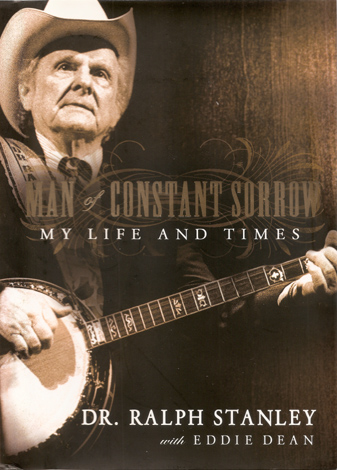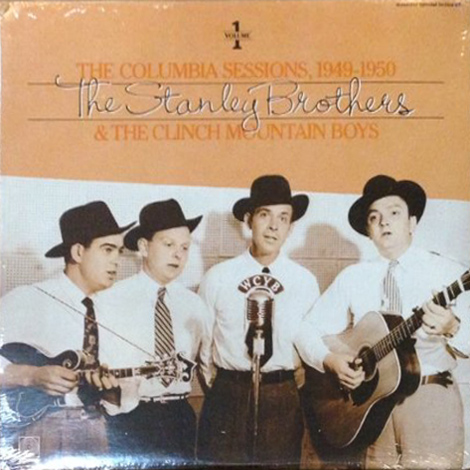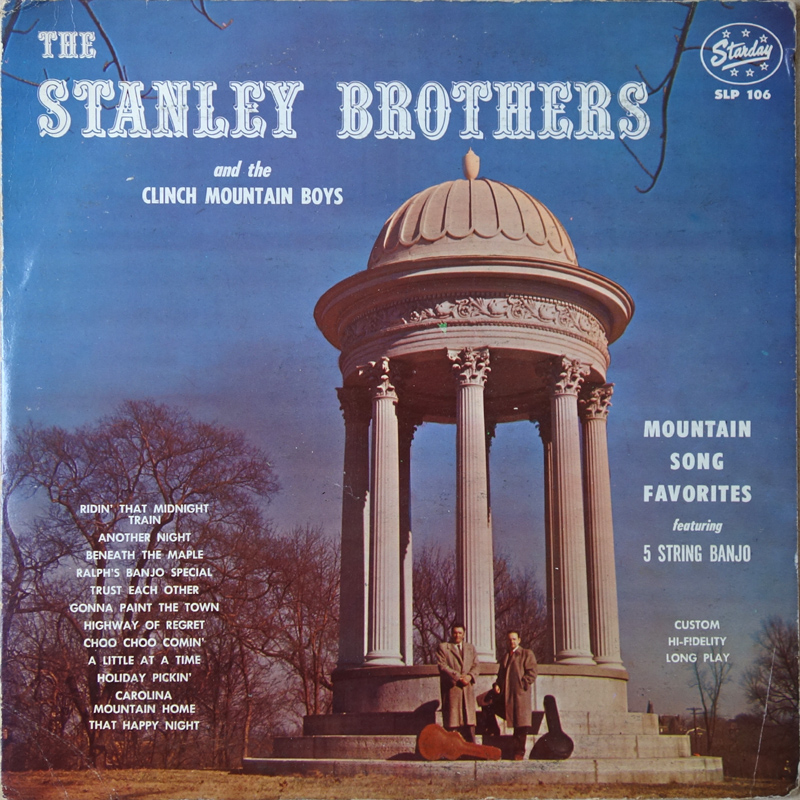- Bill Gatton Chevy Show
- Carter Stanley Interview - 1966
- How Far To Little Rock? - Search live shows
- Jim Kent's film 'Ralph Stanley's Bluegrass Festival'
- New WCYB Recording
- Pound Va. 1972 - Video
- Replica Rebel T-Shirt
- R.I.P. Ralph
- Roy Lee Centers Last Show
- Song & Memory Books
- Stanley Brothers - WCYB Acetate
- Stanley Standard - Carter Stanley Memorial Issue
- Suwannee River Jamboree
- Up In The Cloud - 1957-62
Dr. Ralph Stanley with Eddie Dean - Man Of Constant Sorrow
My Life And Times
(Gotham Books ISBN: 978-1-592-40425-4) 2009 (Hardcover)

This 452 page book, is surprisingly quite a candid and revealing biography by Ralph and Eddie Dean. In most interviews I've read, Ralph seems a pretty reticent and reluctant participant, but here he speaks much more openly and in far more detail about his life.
As he says in the 'Prologue': "It's been so long since Carter passed away. I haven't talked much about it. It hurt too much to remember, so I've tried to let it go to the past. But I've lived so long, the past has caught up with me, and I believe it's time to face it down. There were a lot of things I never got to tell Carter when he was still around, and tell my mother and so many others who have passed on as well. There are a lot of things I haven't said to a lot of people, and it's time to change that. I think it's time for me to look back and remember, the good memories along with the bad.... This book is my way of saying all the things I haven't been able to say, before it's too late."
What makes this book work so well is that it reads like Ralph is talking to you personally, recalling anecdotes and his thoughts, but at the same time Eddie Dean weaves in information gleaned from other sources, such as incidents caught on live Stanley Brothers recordings,[1] and historical facts for context.
I sometimes find biographies can be quite 'dry' and difficult to get through, but this is one of those books that is difficult to put down. Even if you're just a casual bluegrass fan, I think you'll enjoy it.
The 27 chapters cover pretty much everything from Ralph and Carters childhood years onwards, and the book is split roughly into three sections covering their formative years, the two decades with Stanley Brothers, and Ralph's solo career.
Ralph's recollections of growing up on the farm are quite vivid, painting images of how hard rural life was back in the 1930s, the schoolboy pranks and mischief making, the farm chores and even a little moonshine running, but also how dignified the country folk were and the social aspects of both the church and neighbourly get togethers. Rural life wasn't always idyllic however. When Ralph was 4 he saw the aftermath of his aunt's murder / uncle's suicide at the homestead where the family would later live... and when he was 12, their father abandoned them to live with another woman. Times then were even tougher for their family, with Ralph helping his mother as much as he could.
The Stanleys' early musical influences are naturally covered too, from baptist church singing, their mother's banjo playing and their father's late night habit of singing on the porch. Entertainment also came from listening to the 'Opry, Mainer's Mountaineers and Carter Family on the radio; old 78's played on a wind-up victrola; and visiting bands.
The chapters of the book which deal with the history of the Stanley Brothers will broadly be familiar to anyone who has read previous accounts of the band or seen the 'Ralph Stanley Story' DVD, but there is a lot of anecdotal snippets in Ralph's first hand account. Some of it is quite astonishing, like the pet alligator one CMB kept in their Bristol lodgings, the brief acknowledgement of womanising on the road, or Carter and George Shuffler's prediliction for pranks with laxatives. There are also some fascinating tales, like Earl and Louise Scruggs visit with the Stanley's in between Scruggs leaving Bill Monroe and the formation of Flatt & Scruggs.... Earl, apparently was quite friendly and showed Ralph some of his 3-finger banjo style. But after the Foggies had formed and had joined WCYB, attitudes hardened, with Lester and Carter eventually having a bust-up outside the radio station.
Then there's tale of the un-named 'entertainer' who in their early WCYB days got some gigs booked by the Stanley Brothers' father (Lee Stanley), but then refused to pay him a percentage. He and Carter fell out over it and thirty or so years later, when the 'entertainer' made his sole appearance at the 'Old Home Place', he took pleasure in urinating on Carter's grave and boasting about it.[2]
On a more pleasant note, if you've heard any of the Stanley Brothers live recordings featuring Lindy Clear aka 'Tennessee Mort's weird & wonderful imitations, you'll be glad to hear there is a section with some of his background history, and the same goes for Leslie Keith, Fiddlin Cowan Powers, Pee Wee Lambert, Chubby Anthony, Chick Stripling, Art Stamper and George Shuffler.
Ralph also confronts Carter's gradual addiction to alcohol, which weakened his singing voice, his gifted songwriting/emcee work and ultimately took his life. The Stanley's endured a repeated musical rollercoaster of regional success and near starvation that dogged the band; but without Carter's irrepressible optimism that 'better days were just around the corner', Ralph would have quit several times over. Indeed, they did take a break for a while in 1951 when Carter played with Bill Monroe and again in 1953 when they were forced to get 'proper' jobs making cars in Michigan, before Jimmy Williams talked them back on the road.
Ralph's early solo career, is likewise covered in detail, with the stories of getting back on the road after Carter's death and the recruitment of Larry Sparks, Roy Lee Centers and the 1970 discovery of Ricky Skaggs and Keith Whitley. Ralph doesn't mention all of the CMB's by name, but Curly Ray Cline gets a chapter dedicated to himself, with various anecdotes of on-the-road pranks, his love of food & fox-hunting and insights into Curly's attitude to life.
In other chapters Ralph talk's about being a Shriner; the professional standards of being a CMB in his band (on and off the stage) and his distaste for newgrass. Also covered are his relationship with Rebel records and his friendship with Bill Monroe. Ralph also goes into his faith, without being too preachy, and there is a round-up of more recent achievements such as the 'Oh Brother' sessions, winning a grammy and becoming a member of the 'Opry.
In a nutshell, I reckon this is a must-read for any fan of Ralph and Carter's music.
There is only one niggle. Although Ralph's recollections go way beyond what might be expected, especially for someone who is obviously very private, there are only very fleeting mentions of Ralph's earlier marriage(s) prior to his marrying Jimmie Cheek (nee Crabtree) in July 1968.[3]
The only other potential down sides to the book, are that there is no pictures (other than on the inside cover) and that there is no index. Not having an index isn't a problem if you're reading for entertainment, but if you're trying to use it as a reference it's a bit of a pain.
The book is also available as a Paperback, and e-book.
(Review by Ivor Trueman.)

[1] If you've listened to all the Stanley Brothers live recordings that have been released and got the various 'Stanley' DVDs, you may notice that several events are referenced in the book e.g. The nest of 'yellow jackets' on The Stanley Brothers - 'Riding That New River Train' (Stanleytone ST-C-5002) or the on stage banter at the Ash Grove. LA.
[2] In Mac Wiseman's 'All My Memories Fit To Print' (Nova Nooks) 2015 (page vi), Mac says: "Sure there are some things best left unsaid... (like) the pleasure derived from relieving myself on the grave of a late musical nemesis." Mac played at the old homeplace at Ralph's 'Homecoming Festival' in 1977.
[3] Ralph has been married three times. His first marriage was extremely short lived and from his second marriage, Ralph had one son Timmy Stanley who is pictured in one of the Stanley Brothers songbooks.








